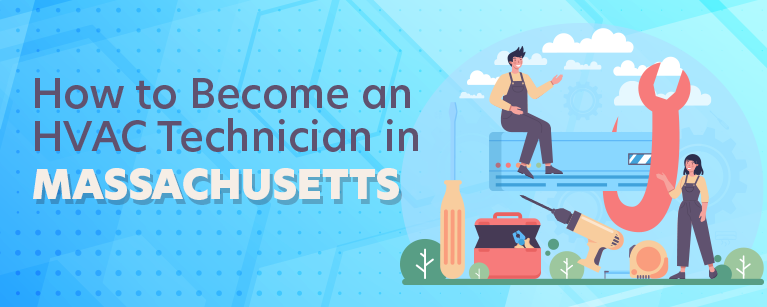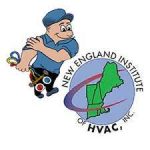
Are you passionate about exploring how the latest mechanical innovations can improve lives?
As an HVAC technician in Massachusetts, you’ll be on the cutting edge of comfort technology.
From programmable thermostats to variable-speed compressors, the equipment designed to heat and cool both massive commercial developments and cozy homes is always becoming more advanced.
It’s an exciting career for self-motivated problem-solvers.
One day you could be optimizing the performance of a hospital’s air handlers, and the next you could be upgrading a senior living facility’s ventilation systems.
Through hands-on training and manufacturer certifications, you’ll gain the expertise to install, service, and troubleshoot these sophisticated systems.
With climate control needs constantly evolving, you’ll never lack engaging work.
In return for keeping people comfortable year-round, you’ll enjoy competitive wages and benefits.
Does working with leading-edge indoor environment systems appeal to your interests in technology, design, and customer service?
Consider an in-demand role as a Massachusetts HVAC technician.
Table of Contents
HVAC Schools in Massachusetts
For post-secondary HVAC training programs, there are many options.
These programs have gained accreditation from HVAC Excellence, Partnership for Air-Conditioning, Heating, and Refrigeration Accreditation (PAHRA), and the Accrediting Commission of Career Schools and Colleges – (ACCSC)
While some of the programs are offered at community colleges, others are at technical schools, and they all lead to an associate’s degree.
The Peterson School
- Location: Woburn, Westwood, and Worcester, MA
- Time to Complete: 15 weeks for HVAC/R preparation for commercial and industrial refrigeration; 20 weeks for HVAC/R electrical code preparation; 17 weeks for HVAC controls and energy management; 10 weeks for HVAC/R refrigeration code preparation; 17 weeks for basic controls; 18 weeks for advanced refrigeration theory; 15 weeks for each of the three programs “A” and “B”‘s three courses.
- Tuition Costs: HVAC/R preparation for commercial and industrial refrigeration ($4,480); HVAC/R electrical code preparation ($1,420); HVAC/R refrigeration code preparation ($560); HVAC controls and energy management ($2,120); advanced refrigeration theory ($1,800); and basic controls ($1,960); as well as the three-course programs Combo “A” and “B” ($7,000 and $7,220, respectively).
New England Institute of HVAC
- Location: Lowell, MA
- Time to Complete: 13 weeks
- Tuition Costs: Day class ($6,975); night class ($5,975)
Springfield Technical Community College
- Location: Springfield, MA
- Time to Complete: 12 months
- Tuition Costs: In-state ($329 per credit); Out-of-state ($546 per credit)
Benjamin Franklin Institute of Technology
- Location: Boston, MA
- Time to Complete: Nine months
- Tuition Costs: $8,475 per semester
MTTI
- Location: Seekonk, MA

- Time to Complete: Day program (30 Weeks); Evening program (75 weeks)
- Tuition Costs: $18,500
Porter and Chester Institute
- Location: Brockton, MA; Chicopee, MA; Worcester, MA
- Time to Complete: 12 months
- Tuition Costs: $29,530
| School Name | Address |
|---|---|
| The Peterson School | 25 Montvale Ave, Woburn, MA 01801, United States |
| New England Institute of HVAC | 240 Smith St, Lowell, MA 01851, United States |
| Springfield Technical Community College | 1 Armory St, Springfield, MA 01105, United States |
| Benjamin Franklin Institute of Technology | 41 Berkeley St, Boston, MA 02116, United States |
| MTTI | 1241 Fall River Ave, Seekonk, MA 02771, United States |
| Porter and Chester Institute | 156 Boston Ave, Bridgeport, CT 06610, United States |
HVAC Technician Apprenticeships in Massachusetts
In Massachusetts, HVAC technicians have the option to become licensed through a multi-year apprenticeship program.
Both union and non-union apprenticeships are available across the state.
All apprenticeship programs require a minimum of 8,000 hours of on-the-job work experience, usually accrued over four years.
Apprentices must also complete at least 150 hours per year of classroom instruction at a technical school or training center.
Coursework covers technical, mechanical, and business aspects of the HVAC industry.
Apprenticeship options include joint apprenticeship programs run by unions like the Plumbers and Pipefitters Local 4.
Non-union apprenticeships are offered through technical high schools, independent training centers, and individual HVAC contractor companies.
To apply for an HVAC technician apprenticeship, individuals must obtain employment with a licensed Massachusetts HVAC contractor.
They also need to register with the state’s Division of Apprentice Standards and hold a valid HVAC technician license throughout training.
Completing an apprenticeship fulfills the requirements to obtain full HVAC technician licensure from the Massachusetts Department of Public Health.
This allows apprentices to begin independent service work.
How to Become an HVAC Technician in Massachusetts Step by Step
Educational Requirements
Most employers in Massachusetts will expect technicians to have formal education in HVAC principles and techniques.
Luckily, the Bay State has numerous options for HVAC training close to home.
Both certificate and associate degree programs are available at trade schools and community colleges across the state.
While programs vary in length, most take one to two years of full-time studying to complete.
Besides having a high school diploma or GED under your belt, individual schools may require a couple of basic math and science courses.
Being at least 18 years old is also standard.
Then it’s time to fill out applications, round up transcripts, and cross your fingers for interviews.
Licensing and Certification Requirements
HVAC technicians must obtain industry-recognized certifications in Massachusetts:
- EPA Section 608 The majority of HVAC programs offer certification for handling refrigerant, which requires passing a four-part test.
- NATE Certification, which validates competency across eight technical areas through online exams. Though optional, it is highly recommended.
For certifications to remain valid, ongoing education is required.
By doing this, technicians are guaranteed to stay current with technology.
Salary and Job Outlook
The average annual wage for HVAC technicians in Massachusetts is $65,963, with a median hourly wage of $32.91.
Salaries vary depending on experience, location in the state, and commercial or residential sector.
Annual Salary Range:| Location | Avg. Annual Salary |
|---|---|
| Boston | $55,243 |
| Worcester | $51,742 |
| Springfield | $51,225 |
| Lowell | $53,487 |
| Cambridge | $55,243 |
| New Bedford | $52,168 |
| Brockton | $53,541 |
| Quincy | $55,243 |
| Lynn | $55,243 |
| Fall River | $52,168 |
Regional Salary in Massachusetts
| Region | Employed | Avg. Annual Salary | Avg. Hourly Pay | Top 10% Annual Salary | Bottom 10% Annual Salary |
|---|---|---|---|---|---|
| Barnstable Town, MA | 280 | $64,070 | $30.8 | $82,830 | $44,210 |
| Boston-Cambridge-Nashua, MA-NH | 4,730 | $72,230 | $34.73 | $97,550 | $46,380 |
| Leominster-Gardner, MA | 110 | $61,420 | $29.53 | $84,080 | $42,270 |
| New Bedford, MA | 70 | $62,670 | $30.13 | $80,830 | $37,150 |
| Pittsfield, MA | 130 | $61,110 | $29.38 | $78,120 | $37,480 |
| Springfield, MA-CT | 700 | $65,030 | $31.27 | $83,230 | $44,710 |
| Worcester, MA-CT | 590 | $64,340 | $30.93 | $82,440 | $41,680 |
* Employment conditions in your area may vary.
Frequently Asked Questions
What is the typical work schedule for an HVAC technician?
Most HVAC technicians work full-time, which is typically 40 hours per week, Monday through Friday.
However, technicians may be on-call some evenings and weekends to provide emergency repairs for customers.
During especially hot or cold spells, technicians may work more hours to handle increased service calls.
Some companies also offer overtime opportunities.
What tools are required for HVAC work?
Technicians use many different hand and power tools on the job.
Some essential tools include wrenches, sockets, pliers, screwdrivers, voltage testers, pipe benders, crimping tools, torque wrenches, manifolds, vacuum pumps, and gauges.
Larger tools like ladders and lift equipment are also needed.
Apprentices should expect to purchase at least a basic toolkit.
How much math is involved in HVAC?
While HVAC technicians don’t need to be math experts, they use basic mathematical concepts daily.
Key math skills include measuring, solving basic equations, calculating gas and electrical usage, and converting between standard and metric units.
Technicians also need to understand conduit and wire sizing charts.
Familiarity with decimals, fractions, ratios, and proportions is very helpful in the field.
HVAC Technician Info by State
- Alabama
- Alaska
- Arizona
- Arkansas
- California
- Colorado
- Connecticut
- Delaware
- Florida
- Georgia
- Hawaii
- Idaho
- Illinois
- Indiana
- Iowa
- Kansas
- Kentucky
- Louisiana
- Maine
- Maryland
- Massachusetts
- Michigan
- Minnesota
- Mississippi
- Missouri
- Montana
- Nebraska
- Nevada
- New Hampshire
- New Jersey
- New Mexico
- New York
- North Carolina
- North Dakota
- Ohio
- Oklahoma
- Oregon
- Pennsylvania
- Rhode Island
- South Carolina
- South Dakota
- Tennessee
- Texas
- Utah
- Vermont
- Virginia
- Washington
- West Virginia
- Wisconsin
- Wyoming









